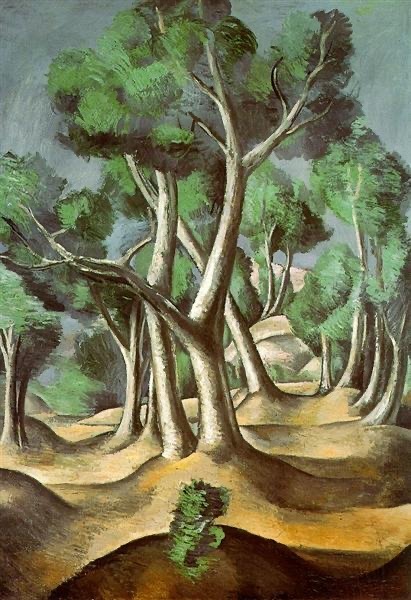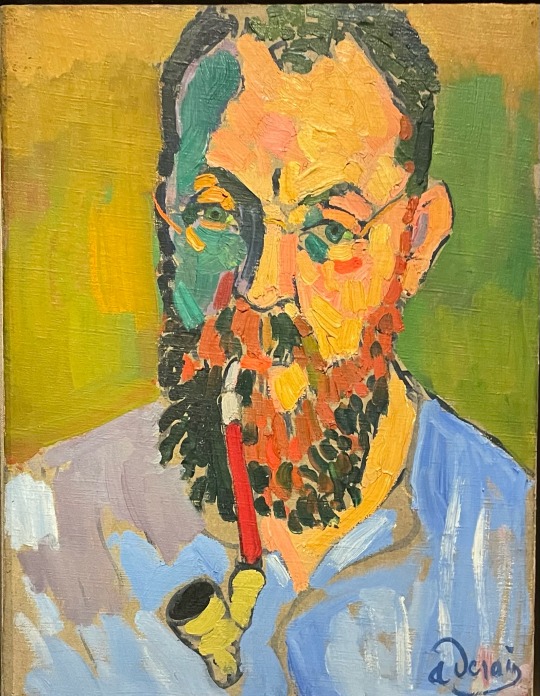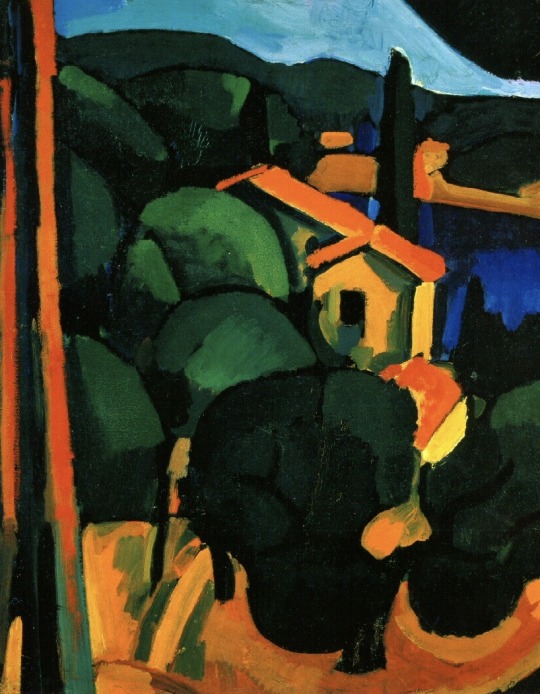#andre derain
Explore tagged Tumblr posts
Text
Tips for Critical Reading

You'll find many ways to read and understand a text, but keeping a journal as you read is one of the best ways of exploring a piece of writing. By integrating reading and writing, you can interact with the work more fully.
Begin each new novel, play or poem without predetermined bias. If you decide in advance that all good art uses realistic settings and promotes your personal moral values, you close out the possibility of new experiences. You do not have to, nor should you, enjoy every work of literature that you read, but you should be willing to recognize that the imagination is limitless.
Read slowly. This suggestion can't be stressed enough. If you roller-skate through an art museum you won't see the paintings.
Read with pen in hand. Underline key phrases, speeches by major figures, or important statements by the narrator. But don't limit yourself. Underline or highlight anything that seems important or striking. Take notes on ideas or questions (don't trust your memory). Write in the margins. Keep a list of the characters and/or major events on the inside of the front cover. Circle words used in special ways or repeated in significant patterns. Look up words that you don't know or words you think you know but seem to have a special weight or usage.
Look for those qualities that professional writers look for in real life: conflict, contrast, contradiction, and characterization.
Look for rhythm, repetition, and pattern. Successful works of literature incorporate such structural devices in the language, dialogue, plot, characterization, and elsewhere. Pattern is form, and form is the shaping the artist gives to his or her experience. If you can identify the pattern and relate it to the content, you'll be on your way to insight.
Ask silent questions of the material as you read. Don't read passively, waiting to be told the "meaning." Most authors will seldom pronounce a moral. Even if they do, a work of literature is always more than its theme. Use the questions devised by reporters: Who, What, When, Where. Why and How may take more study—such questions probe the inner levels of a text.
Keep a reading journal. Record your first impressions, explore relationships, ask questions, write down quotations, and copy whole passages that are difficult or aesthetically pleasing.
The Reading Journal
Christopher Thaiss in Write to the Limit (Chicago: Holt, 1991) notes that the word journal comes from the French word for day, which is jour.
The word indicates that a journal is kept daily.
Thaiss also suggests that journals are kept for many different reasons: to record events, to keep an ongoing public record, to record feelings, to make close observations for scientific purposes and, finally, to explore emotions, memories and images in order to think and learn about any subject.
Don't feel overwhelmed. Just relax; notice and feel things.
Associate ideas with other subjects, objects or feelings.
Try the following 3 steps:
First, write what you see in the text at the surface level.
Next, write what you feel about what you see.
Finally, write down what you think it means or why you think it is important.
Source ⚜ More: Writing Notes & References
#studyblr#writeblr#critical reading#dark academia#light academia#langblr#literature#writers on tumblr#writing prompt#poetry#poets on tumblr#spilled ink#reading#booklr#books#journaling#writing reference#on writing#writing tips#study tips#writing advice#andre derain#expressionism#art#writing resources
143 notes
·
View notes
Text

Portrait of Lucien Gilbert
Artist: André Derain (French, 1880–1954)
Date: c. 1905
Medium: Oil on canvas
Collection: Metropolitan Museum of Art, New York City, NY, United States
Description
This picture is one of several dynamic, boldly-colored portraits that Derain created around 1905. In addition to depicting Gilbert, a childhood friend of the artist and later a collector of his work, Derain also painted portraits of his fellow artists, Matisse (Tate, London), and Vlaminck (Musée des Beaux-Arts de Chartres).
#portrait#painting#oil on canvas#man#sitting#interior#elegant#coat#bow#hat#lucien gilbert#andre derain#french painter#french ulture#fine art#oil painting#20th century painting#bold#color#european art#artwork#chair#flowers#the metropolitan museum of art
49 notes
·
View notes
Text
Similarities in Art of different Artists
Too much of Thomas Downing or too much of Damien Hirst? (spot paintings)
Too much of Andre Derain or too much of Henri Matisse? (fauvism)
Too much of George Braque or too much of Pablo Picasso? (cubism)
Too much of Hieronymus Bosch or too much of Salvador Dali? (surrealism)
#andre derain#henry matisse#georges braque#pablo picasso#thomas downing#damien hirst#similarities#style similarities#respect#hieronymus bosch#salvador dali
22 notes
·
View notes
Text

Andre Derain
The Grove
1912
#modern art#andre derain#derain#the grove#landscape#fauvism#fauvist#wild beasts#french painter#french painting#french art#fauvist painting#treescape#trees#art history
158 notes
·
View notes
Text

André Derain, Vue de Cassis, 1907
Oil on canvas
21 1/4 by 25 5/8 in. 54 by 65.1 cm
27 notes
·
View notes
Text

André Derain
#andré derain#andre derain#landscape#art#artwork#fine art#fineart#painting#art history#history of art
21 notes
·
View notes
Photo

André Derain (French, 1880-1954), Trois baigneuses [Three bathers], c.1906. Watercolour, gouache and pencil on paper, 50.2 x 65.2 cm.
391 notes
·
View notes
Text

76 notes
·
View notes
Photo

Andre Derain - Self Portrait with a Cap, c.1905
André Derain (10 June 1880 – 8 September 1954) was a French artist, painter, sculptor and co-founder of Fauvism with Henri Matisse.
101 notes
·
View notes
Photo



André Derain’s illustrations for Antonin Artaud’s Heliogabalus: Or, The Anarchist Crowned
156 notes
·
View notes
Text

André Derain The girl cutting apple 1938
74 notes
·
View notes
Text

"L'assiette de fruits", André Derain, 1912. Oil on canvas.
6 notes
·
View notes
Text

André Derain
Landscape
#andré derain#andre derain#french artist#french art#french painting#french painter#fauve#les fauves#fauvist#fauvism#landscape#landscape painting#landscape artist#landscape art#art on tumblr#modern art#art history#aesthetictumblr#tumblraesthetic#tumblrpic#tumblrpictures#tumblr art#aesthetic#beauty
50 notes
·
View notes
Text

André Derain, Matisse et Terrus, Painted in 1905
oil on canvas
40.3 x 54.3 cm. 15 7⁄8 x 21 3⁄8 in.
8 notes
·
View notes
Text
You guys need to see my vision.
André Derain's oil painting "Three Figures Seated On Grass" (in French: "Trois personnages assis dans l'herbe") would be a great composition for an X-men fanart piece.
The guy on the far left gives me such big "Scott Summers vibes" specifically chilling at the beach.
(trying to find good photos of old artwork is difficult, colors and saturation vary so much)


#andre derain#andré derain#french artists#french artist#french art#Trois personnages assis dans l'herbe#Three Figures Sitting in The Grass#tangentially related to Scott Summers#scott summers#x-men#xmen#my post#mypost
3 notes
·
View notes
